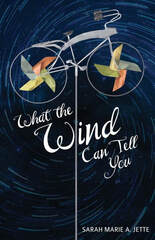
Sarah Marie A. Jette is the award-winning author of What the Wind Can Tell You, which tells the story of seventh-grader Isabelle Perez and her older brother Julian, who has epilepsy. We love her strong, relatable characters and lyrical writing. We’re thrilled to present our interview with her, where she discusses her inspiration for What the Wind Can Tell You, her tips for aspiring writers, and more!
RapunzelReads: What inspired you to write What the Wind Can Tell You from Isabelle’s perspective?
Sarah Marie A. Jette: Many years ago, I nannied for a friend of mine whose son was recently diagnosed with epilepsy. He was only a few months old and seemed to be startling himself when he was falling asleep. His parents soon learned that he was having small seizures. His parents asked me to babysit him on Sundays and I did so for about two years. I fed him with a bottle, administered medication, suctioned him when he had too many fluids, and soothed him through seizures. When swallowing became difficult, I learned how to use a feeding tube. A few years later, he became a big brother. I raced over as soon as I could to meet the new baby. I started imagining
It took me about seven years to write What the Wind Can Tell You. I wanted to be sure I got the story right. This family means a lot to me and I wanted to make sure my portrayal of epilepsy and all the medical complications that Julian has were done carefully and authentically. The two boys and their parents love the book and we’ve even done a book event together at Boston’s Children’s Hospital.
RR: What books inspired you when you were growing up?
SMJ: The book that inspired me the most when I was growing up was Mildred Taylor’s Roll of Thunder Hear My Cry. My fifth grade teacher read this book to our class. I was captivated by Cassie Logan. She’s got so much spunk. She cares deeply for her family, she stands up for herself, she questions the world around her. This was one of the few books I read as a child where the main character was a person of color. Before then, I had never read a chapter book with a brown skinned girl in it! Cassie and I have different cultural backgrounds (I’m Mexican American, she’s African American), but for the first time, I could imagine the possibility of a character like me being the protagonist in a book. I now read Roll of Thunder to my 4th graders ever year.
RR: What was your favorite part of writing What the Wind Can Tell You?
SMJ: My favorite part of writing What the Wind Can Tell You was when I revised with my editor. Before I signed my book contract, my editor sent me four pages of revision notes. It began with one or two sentences where she told me how much she loved the book, the rest were notes about things I needed to change. As a writer, receiving feedback can be difficult – writing is so personal! However, feedback can act like a fuel. Often, when my editor questioned a passage or asked me to change a plotline, a small part of me had already suspected that that part of the story or that character had a flaw. With her guidance, I transformed my original manuscript into a much stronger story. It took several rounds of revisions, but it was worth it!
RR: Do you have any tips for an aspiring writer?
SMJ: My tips for an aspiring writer are as follows.
- READ!!! Read for pleasure. Read books that make you happy, read books that inspire you, read books that show you a different way of living. Re-read books you love.
- Read like a writer. When you find yourself lost in a story or connecting to a character, dissect the text and try to figure out what the author did to draw you in. Look at how the writer begins chapters or how they build up to the big moment. Do you like faster paced books? How does the author carry you along? Do you like books with poetic language? Find examples of alliteration or simile or personification and see how the author uses these tools.
- Write. Some days you might just write about an experience you had, or a daydream, or a fantasy world. You can re-write the ending to a book you just finished. You can write the next chapter in a book you finished. It took me a long time to come up with an idea big enough for a whole book, but I have a lot of writer’s notebooks that are filled with snippets and small scenes. Sometimes I draw from these when I’m writing. They keep your writer’s mind sharp.



 RSS Feed
RSS Feed
